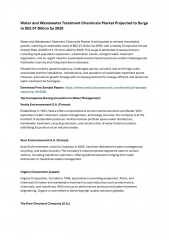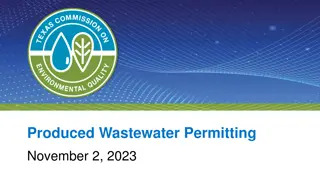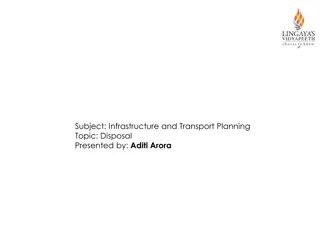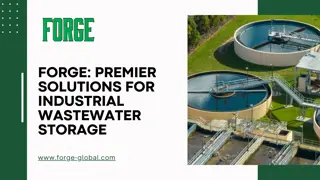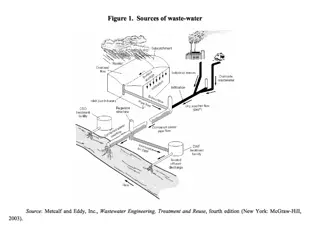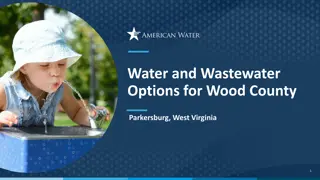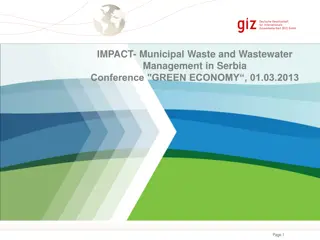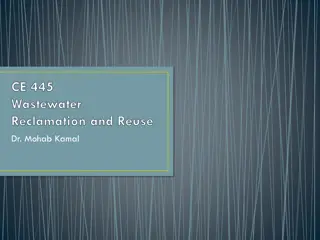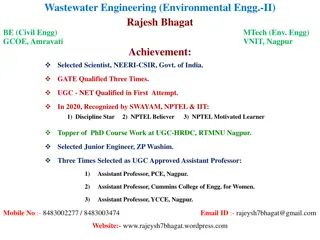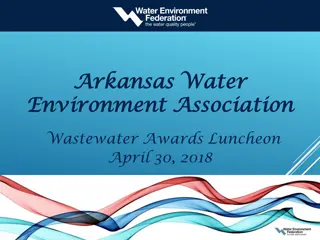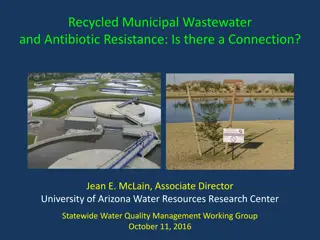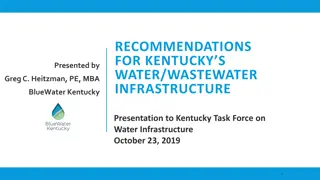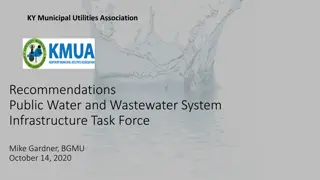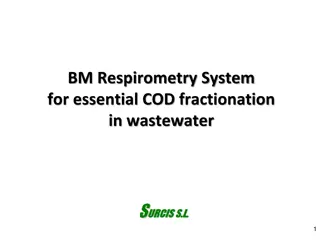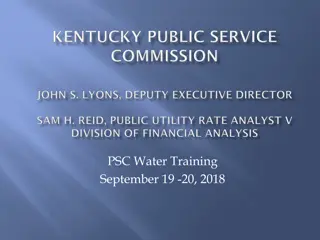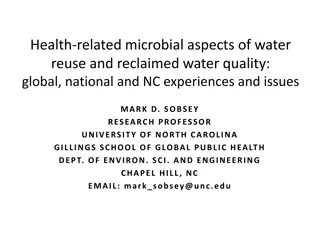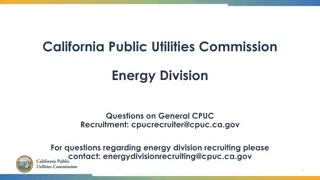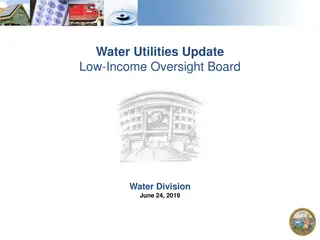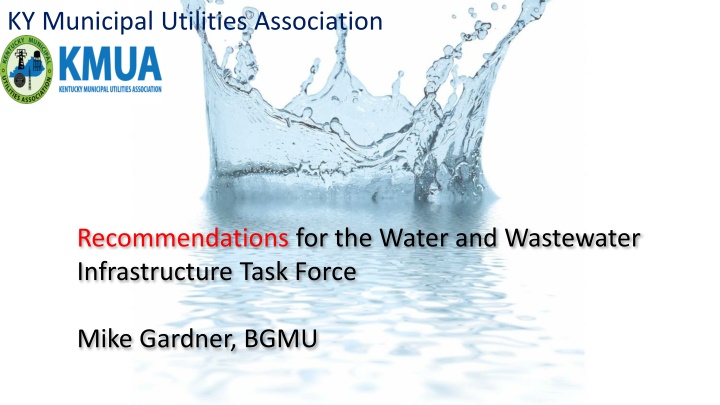
KY Municipal Utilities Association Recommendations for Water and Wastewater Infrastructure Task Force
"Kentucky faces challenges in its water and wastewater infrastructure, requiring short and long-term plans for aging systems. The Kentucky Municipal Utilities Association proposes solutions focusing on leadership, accountability, funding, and best management practices."
Download Presentation

Please find below an Image/Link to download the presentation.
The content on the website is provided AS IS for your information and personal use only. It may not be sold, licensed, or shared on other websites without obtaining consent from the author. If you encounter any issues during the download, it is possible that the publisher has removed the file from their server.
You are allowed to download the files provided on this website for personal or commercial use, subject to the condition that they are used lawfully. All files are the property of their respective owners.
The content on the website is provided AS IS for your information and personal use only. It may not be sold, licensed, or shared on other websites without obtaining consent from the author.
E N D
Presentation Transcript
KY Municipal Utilities Association Recommendations for the Water and Wastewater Infrastructure Task Force Mike Gardner, BGMU
KENTUCKY A PROVEN SUCCESS STORY! Public water supply compliance and drinking water quality in Kentucky has been very good. Kentucky has been successful - 2020 Plan. Aging infrastructure and distressed water and wastewater systems are significant challenges. Roughly $14.5 billion is needed over the next 20 years really means $132.05 per Kentuckian per year for 20 years! A short term plan is needed to address distressed and failing systems and a long term plan is needed to address ongoing aging infrastructure. These challenges can be met with cooperation, collaboration and commitment.
Challenges to be Addressed; Leadership Issues Clarification of regulatory Roles Utility Accountability and Enforcement Issues Funding for accountability and Enforcement Utility Rates and Rate Review Capital Funding
WHAT ARE BEST MANAGEMENT PRACTICES? Technological practices - ensure that technology is updated, efficient, and is able to provide the level of treatment to provide the necessary assurances of health and environmental standards. Financial practices - ensure that rates include operation and maintenance costs, capital planning, debt payments, infrastructure replacement, reserve funds, inflation, etc. Managerial practices - ensure that staffing and training needs are met including specific water and wastewater treatment practices, operating procedures, infrastructure maintenance and replacement procedures, water loss controls, accountability and transparency.
Change, cooperation, collaboration and commitment are needed to create Sustainability of Kentucky s Water and Wastewater Infrastructure. These are KMUA s Proposed Recommendations:
KMUAs RECOMMENDATIONS Establish a Utility Taskforce to empower, streamline and facilitate necessary change. Change that supports sustainability of KY s water and wastewater infrastructure needs to be championed by utility experts in cooperation with state agencies. Each public water system must recognize their role in protecting KY s Public Health. Each System must be accountable and apply Best Management Practices.
RECOMMENDATIONS: Independent Annual Audits for every system : Financial Audit Reviews Two years of deficits trigger system review Proper Accounting Practices General Financial Capability
RECOMMENDATIONS: Best Management Practices that include: Asset Management /Capital Budget Plans. Economic based Non-Revenue Water Programs. Require revenues generated to be used only for utility operations, including infrastructure needs. Closely track grants and loans to use only for intended purposes. Ensure adequate staffing, certification, compensation and benefits are in place at every system. Training requirements for Board members or elected officials overseeing utility operations.
RECOMMENDATIONS Rate Making Practices that include: Remove the politics from rate making Require rates to be adjusted annually for inflation. Require an independent rate review every three years. Rates should be cost based and sufficient to cover all debt service and coverage requirements as well as all operation, maintenance, repair and replacement.
RECOMMENDATIONS FOR DISTRESSED SYSTEMS: Failure to follow BMPs or continued economic distress for more than 2 years should result in formal distressed system review. Create a Board of Public Utility Experts to conduct formal review of distressed systems If distressed system review is unsuccessful, discussions should be initated for regionalization or consolidation with another publicly owned utility. The rescuing public utility must have the capacity to operate and maintain the distressed system. The rescuing utility should not take on the financial burden of the regionalization/consolidation. Financing for appropriate rescue measures should come from a KIA Revitalization Fund.
RECOMMENDATIONS FOR DISTRESSED SYSTEMS: Establish a Revitalization Fund as part of an allocation of $25 million/year for four years from the General Fund. Fast track funding through the KIA Revitalization Fund (Fund B?). Distressed system funds must be in the form of loans to correct system deficiencies. Partial loan forgiveness may follow the implementation of best management practices if sustained by the utility. Failure to meet BMP procedures or loan repayment accountability reverts loan forgiveness portions back to full loans. Rates should be reviewed every year for distressed systems.
RECOMMENDATIONS: Establish funding for state agencies to administer sustainability program Fund by a new general operating permit fees for water/wastewater systems to allow agencies to provide staffing/resources to administer the program.
FINAL RECOMMENDATION: Create a Utility Task Force to: Further study of the issue. Suggest changes to regulations, statutes legislation, policies and funding mechanisms, to implement real change. Include perspective of utility managers, agencies and associations. Task force should be comprised of representatives of DOW, KIA, PSC, KMUA, KLC, KACO, KRWA, DLG, RCAP
KY Municipal Utilities Association Mike Gardner, BGMU, mike.gardner@bgmu.com Annette DuPont-Ewing, KMUA, adekmua@gmail.com

